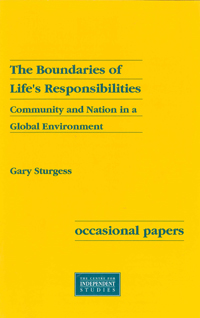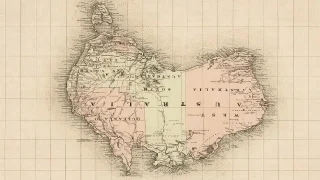
Globalisation means increasing international influence on domestic life. Australians are selling and buying more on international markets, and the Australian government is subjecting itself to a wide variety of international treaties and agreements. As Gary Sturgess shows, though, this upward move has parallels in the creation of the nation-state. In each case, people sought the advantages of cooperating over larger areas.
Changes of this kind create problems. The ‘boundaries of life’s responsibilities’ become more difficult to draw, as people feel conflicting loyalties. Obligations to oneself, family, local region, nation and the global community cannot always be reconciled. As authority moves outside the old political boundaries, it becomes less subject to democratic control.
Gary Sturgess argues that globalisation’s tensions can be eased by clarifying the role of each level of government. Many decisions are best made at a local level, and by giving control of these decisions to local communities feelings of a ‘democratice deficit’ can be alleviated.









